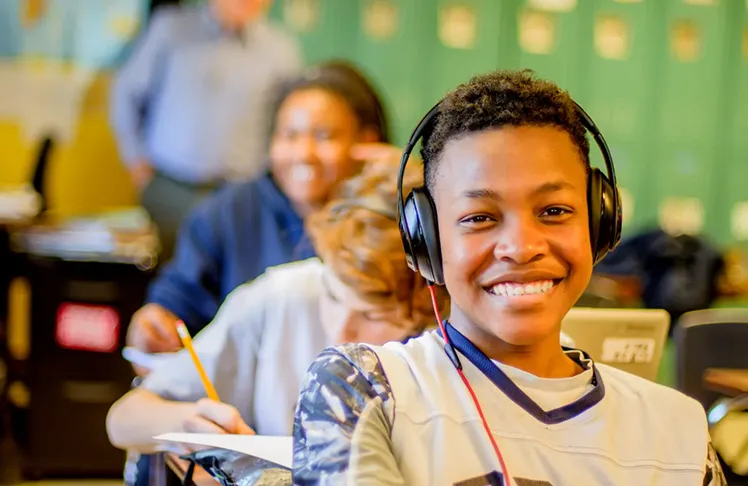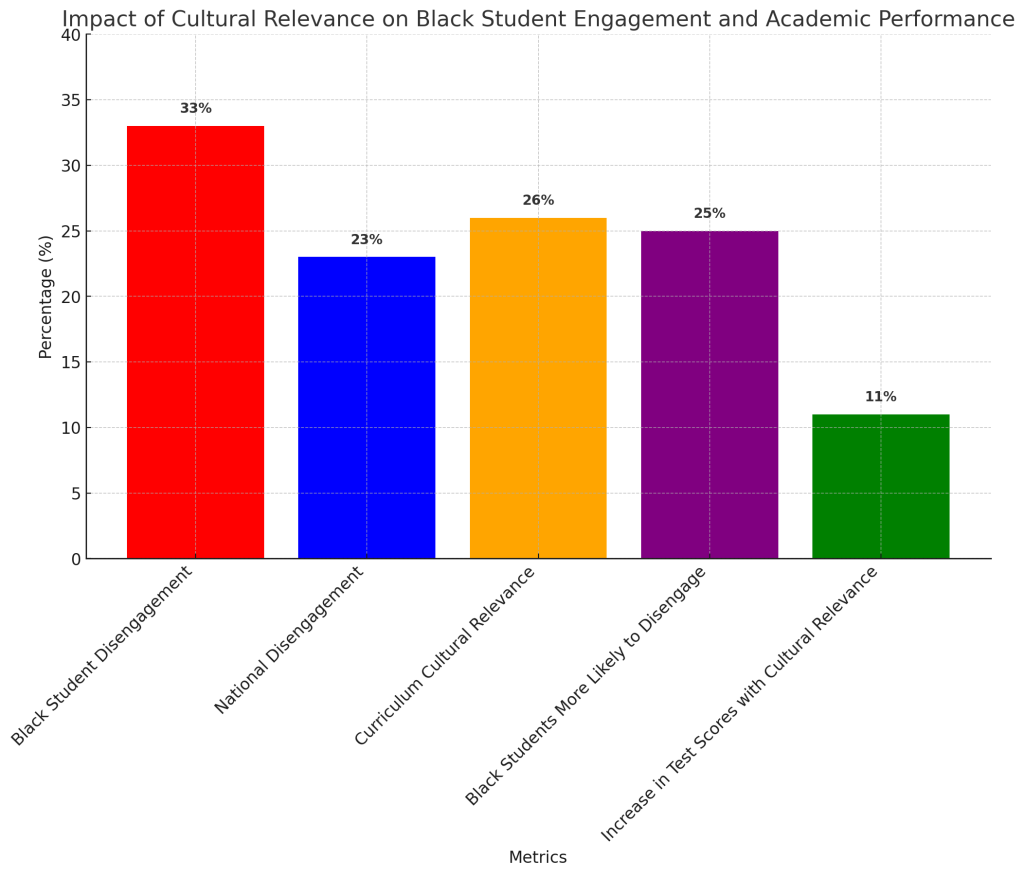

This article is one of a series of articles produced by Word in Black through support provided by the Chan Zuckerberg Initiative. Word In Black is a collaborative of 10 Black-owned media outlets across the country.
Can hip-hop help transform the academic experience for Black K-12 students across the country? Flocabulary, an online learning platform that infuses culturally relevant, hip-hop-based content into academic lessons, proves it can.
“Flocabulary has completely transformed the way my students engage with language arts,” says Mrs. Vivian Jackson, a middle school teacher in Atlanta. “They’re not just memorizing vocabulary words — they have a better understanding and are using them in a greater context. It’s cool to see what a difference it has made.”
The program’s success lies in its ability to resonate with students through content that reflects their culture, history, and experiences. By integrating hip-hop and contemporary language, Flocabulary helps students relate to academic subjects in a more engaging way.
This approach is particularly effective for Black students, who may feel disconnected from curricula that overlook their cultural backgrounds. With this approach, Flocabulary has significantly improved academic performance and enhanced students’ connection to learning.
And innovative solutions such as Flocabulary are certainly needed.
Student Disengagement, Culturally Irrelevant Lessons
According to a report from the United Negro College Fund, about a third of Black students report feeling disengaged in schools, which is about 10% higher than the national average across all student demographics.
Researchers believe the disengagement rate is linked to a lack of culturally relevant curriculum for Black students. In a 2023 survey, Educators for Excellence found that only 26% of educators nationally believe their curriculum is culturally relevant for their student population. In addition, the Social Psychology of Education also found that minimal cultural relevance is a key factor in why Black students are 25% more likely to exhibit disengaged behaviors such as low participation or skipping school.
Culturally relevant content in schools is integral to Black students’ academic performance. According to The Thomas B. Fordham Institute, schools that implemented culturally responsive curricula saw a 10-12% increase in test scores and reported more positive academic outcomes. Such key factors played a role in developing EdTech tools that are not only culturally relevant but also address educational gaps impacting Black students.

What Is Flocabulary & How Does It Work?
“We believe students learn best when they have a voice in their own learning,” according to the Flocabulary website. “Our north star, for nearly two decades, has been to facilitate learning that is not just academically rigorous, but also joyful and reflective of student interests. Every student has a voice. They just need more opportunities to use them. And you’d be surprised what they can do with a microphone in their hands.”
One of Flocabulary’s tools features lesson plan videos using hip-hop music. Each video is designed to align with educational standards and covers specific topics like vocabulary, science, language arts, historical events, or math concepts. The rhythm and rhyme make the information more memorable, helping students retain the material more effectively. After watching the video, students can engage in interactive activities such as quizzes, exercises, and vocabulary games, providing multiple ways to practice what they’ve learned.
Flocabulary also offers a Lyric Lab, which allows students to apply their newfound knowledge by creating their own raps using the vocabulary and concepts they’ve learned in the lesson. Students can choose from various beats and write lyrics that summarize what they’ve learned. Teachers can then track their students’ progress using the program’s assessment tools, analytics, and other information to identify areas where students may need additional support.
A Positive Impact on Academic Performance Nationwide
Educators using Flocabulary in their classrooms have reported significant improvements, with 96.4% of teachers reporting that their students are more engaged in school when using the program. It is particularly impactful for Black students, whose teachers say the program’s content helps them connect more deeply.

Joquetta Jackson, a library media specialist in Randallstown, Maryland, says she uses Flocabulary because it supports culturally responsive teaching and pedagogies. “The lessons and resources are aligned to standards and are easy for me. Not to mention, the videos and lyrics are dope and fresh.”
Dustin Ecker, a fourth-grade teacher in Indianapolis, says he’s noticed the increased student engagement Flocabulary has brought to the classroom. “Flocab works wonders for increasing student engagement because hip-hop in the classroom truly resonates with my kids. It’s easy to get students excited about difficult concepts and for them to work collaboratively on rigorous tasks,” he says.
Flocabulary also reported that 97% of educators who use the program daily or weekly find that students who seem disconnected in class will clearly engage with the program’s lessons. Moreover, 91% of students agreed that they better understood the material after watching a Flocab video or lesson plan.
Reaching Black Students Through Hip-Hop Is Effective
Hip-hop has long been recognized as a medium that deeply resonates with Black youth. Its ability to reflect lived experiences and cultural narratives makes it a powerful educational tool. Founding hip-hop educators like Christopher Emdin have also helped effectively bridge the gap in using hip-hop content to engage Black K-12 students nationwide.
In 2014, Christopher Emdin, an associate professor at Teachers College, delivered a keynote address titled “The Hidden Science of Hip Hop: S.T.E.M. with No Root Bears No Fruit” during the Alumni of Color Conference. Emdin urged educators to embrace hip-hop culture as a means to engage and teach students, particularly Black students, who often feel disconnected from traditional academic content.
“Our kids are different, not deficient,” he said.
Emdin suggested that educators should model their pedagogy after cyphers or rap battles to create similar engagements in the classroom. The long history of hip-hop pedagogy and its structures, such as in the church and community, can be replicated in the classroom. Examples include creating a circular learning environment, co-teaching, creating a shared experience, incorporating where they are from, and adding content like science through rhymes.
Hip-hop’s incorporation into the classroom demonstrates that meeting students where they are culturally should not just be an alternative teaching method but an essential component in promoting equity in education.
The Road Ahead: Addressing the Divide and Inequities
Access to quality educational resources is often limited in underserved communities nationwide. As a digital platform, Flocabulary helps bridge this gap by providing content that has proven to be engaging, effective, and accessible to Black students regardless of location. But it isn’t free: an individual teacher plan costs $11.50 a month, but prices vary between districts and schools.
Sondra Watson, a retired sixth-grade teacher at Kirby Smith Middle School in Florida, doesn’t use Flocabulary but says she hopes more school districts with high populations of Black students like hers will adopt culturally relevant programs into their curriculum.
“I think it’s great that Flocabulary offers their services no matter where a school is in the world,” Watson says, “but I also think it can serve as a call to action for school districts to step up and partner with these programs to help extend the benefits for Blacks students and encourage more development of culturally relevant programs in our students’ classrooms.”















